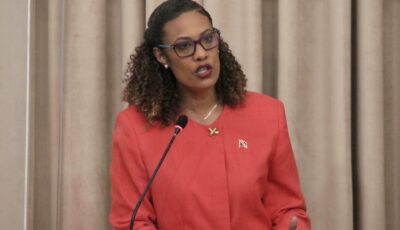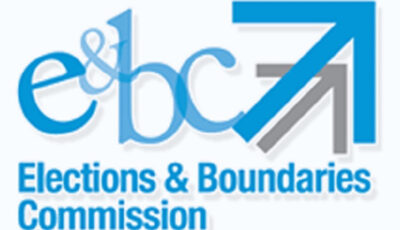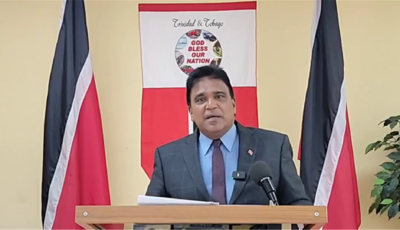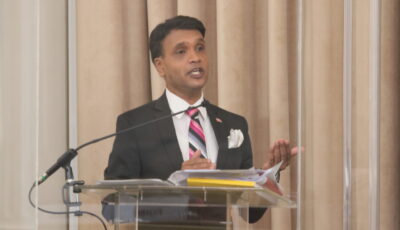Ramlogan: E-mails fake
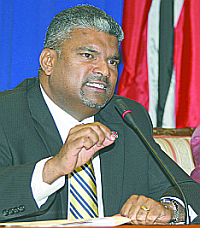 In his statement to the police on the e-mailgate scandal Attorney General Anand Ramlogan has attached reports from two Information Technology (IT) specialists who stated the controversial e-mails were faked.
In his statement to the police on the e-mailgate scandal Attorney General Anand Ramlogan has attached reports from two Information Technology (IT) specialists who stated the controversial e-mails were faked.
On May 20, Opposition Leader Dr Keith Rowley, during his motion of no confidence in the Prime Minister and Government in the Parliament, read from a document containing some 31 e-mails purportedly exchanged between Prime Minister Kamla Persad-Bissessar, Local Government Minister Suruj Rambachan, National Security Adviser to the Prime Minister Gary Griffith and Ramlogan.
The content of the e-mail thread allegedly exposed a criminal conspiracy by high office holders to discredit and physically harm a journalist; to plant bugs in the office of the Director of Public Prosecutions (DPP); to have the DPP removed from office; and to accept payment from an unnamed person in exchange for freedom in relation to the Section 34 fiasco.
Deputy Commissioner of Police (DCP) Mervyn Richardson is leading the probe into the matter.
Rowley has also called for an independent investigation into the issue.
He said that the information was provided to him by a whistle blower and was not a fabrication.
Sources close to the investigation told the Sunday Express yesterday that Ramlogan sought the advice of Roger Sealy, Information Technology manager, Ministry of the Attorney General and independent IT specialist Terrance Mohan.
The Sunday Express obtained a copy of both reports which concluded that the e-mails were not authentic.
Mohan’s report stated that the e-mail trail was filled with technological deficiencies.
“I am of the view that this document does not reflect a genuine exchange of original and authentic e-mails,” stated Mohan.
“To my mind, this document was simply typed out using some text editor to give the appearance of a record of printed e-mails. Expert analysis and closer scrutiny reveals that the e-mail trail is fake,” he added.
Mohan stated that the vital information and essential characteristics were omitted during the course of typing and it was clear that the document was not authentic.
Sealy’s report dated May 21 arrived at the same conclusion.
Sealy went through all of the 31 e-mails and highlighted technological errors.
He stated that the e-mails were not in fact e-mails but that someone took the time to type them.
“My analysis of this document leaves me in no doubt that this is not a genuine exchange of e-mails that were actually sent and received,” he stated.
He said that apart from the inconsistencies found in the e-mail, some things were simply not possible in the cyberworld and the document appeared to be tampered with.
“On the balance however, based on the analysis pointed out above, I am of the opinion that these are not a series of e-mails but rather a possible type-written document,” he stated.
Sealy stated that if the e-mails had appeared to not be tampered, it would be easy to verify their authenticity, as all e-mails had a digital footprint or e-mail trace.
“All e-mails have hidden information found in a message source that contains pertinent information which traces back to the origin of an e-mail. This can be done by looking at the computer systems and servers involved,” he stated.
Both Ramlogan and Rambachan, through their attorney senior counsel Pamela Elder submitted statements to the police.
The Sunday Express understands that in their statements, both men reiterated their denial of sending the e-mails and indicated their willingness to meet with the police.
Persad-Bissessar has also said that she is willing to provide the police with whatever information or electronic devices they require from her with respect to the probe.
Griffith met with the police and in addition to his statement, handed over his cell phone and computer hard drive.
On May 28, Richardson and his team met with Rowley who said that he was willing to cooperate with the police and also hand over his computer once the request was put in writing.
Below is a condensed version of the Sealy report which was attached to Ramlogan’s statement and sent to the police:
Date: 21st May, 2013
Subject: Analysis and Comments of Series of E-mails
I have been asked to review and analyse a document which appears to be a series of e-mails. I have been informed that this document was provided by the Honourable Leader of the Opposition, Dr Keith Rowley and that it was read out in Parliament on Monday 20th May, 2013.
The document has been the subject of widespread media coverage. It has been portrayed as an exchange of e-mails between the Attorney General, the Prime Minister and other Government Ministers.
The AG and Prime Minister have both publicly denied ever sending and receiving any of the alleged e-mails. Similar denials have been made by the other Government Ministers and official mentioned. In this regard, I now submit the following analysis and comments. For ease of reference, I have manually inserted numbers on the top right hand corner of the document.
Conclusion
My analysis of this document leaves me in no doubt that this is not a genuine exchange of e-mails that were actually sent and received. Apart from the inconsistencies noted above, some things are simply not possible in the cyber world as it relates to the series of e-mails identified in the document. The findings above illustrates that the document appears tampered and therefore the document’s authenticity remains extremely doubtful. On the balance however, based on the analysis pointed out above, I am of the opinion that these are not a series of e-mails but rather a possible type written document.
If the series of e-mail had appeared to be not tampered, it will be easy to verify its authenticity, as all e-mails have a digital footprint or e-mail trace. All e-mails have hidden information found in a message source that contains pertinent information which traces back to the origin of an e-mail. This can be done by looking at the computer systems and servers involved.
Please do not hesitate to contact me if you have any further questions or concerns.
Roger Sealy, MSc.,
BSc., CSIH (CERT)
Information Technology Manager
Ministry of the
Attorney General




